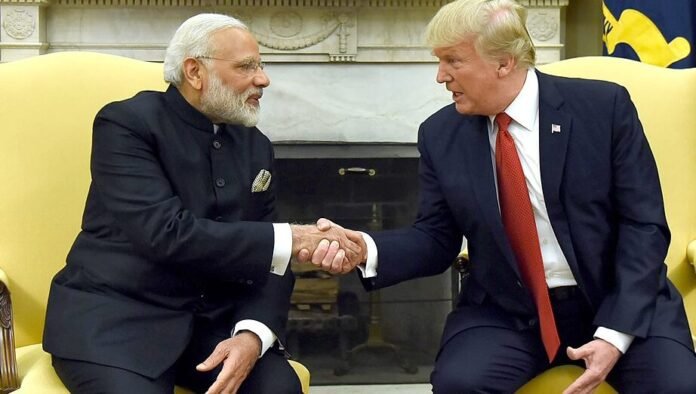Indian officials dismiss the US president’s claim that he used trade threats to halt conflict with Pakistan
India on Monday firmly denied US President Donald Trump’s assertion that he used trade as leverage to halt a dangerous flare-up between India and Pakistan, rejecting the claim as misleading and unrelated to the actual ceasefire discussions.
Speaking anonymously, multiple Indian officials said trade was never part of the dialogue between New Delhi and Washington as the South Asian rivals edged close to war in early May. “There was no reference to trade in any of these discussions,” said one senior official.
Trump, speaking from the Roosevelt Room at the White House on Monday, claimed credit for brokering a “full and immediate ceasefire” between the two nuclear-armed neighbours. He stated, “I said, come on, we’re going to do a lot of trade with you guys, let’s stop it… If you stop it, we’re doing trade. If you don’t stop it, we’re not going to do any trade.”
Trump portrayed trade incentives as a decisive tool: “People have never really used trade the way I’ve used it.”
However, Indian officials countered this narrative, saying the cessation of hostilities came through direct military-to-military talks between the two nations’ Directors General of Military Operations (DGMOs). They insist the deal was brokered independently of US input and conducted entirely on Indian terms.
Hostilities had escalated after India launched Operation Sindoor on May 7 in retaliation for the April 22 Pahalgam terror attack, which killed 26 civilians. Indian forces targeted terrorist infrastructure inside Pakistani territory. What followed were four days of missile exchanges, drone strikes, and long-range bombardments—halted only after both militaries engaged in back-channel coordination.
Officials confirmed there was no mention of trade during calls between US Vice President JD Vance and Prime Minister Narendra Modi on May 9, or between Secretary of State Marco Rubio and External Affairs Minister S Jaishankar on May 8 and 10. Rubio also spoke to National Security Adviser Ajit Doval on May 10—none of which, Indian sources stressed, involved economic bargaining.
Embed from Getty ImagesDespite this, Trump reiterated his claim that the ceasefire had been “US-brokered,” first announcing it on May 10—half an hour before India officially confirmed it. The premature declaration irked New Delhi, with insiders saying the US was attempting to project influence over a process it didn’t lead.
Ironically, in a follow-up social media post on May 11, Trump himself contradicted his earlier assertion by writing, “While not even discussed, I am going to increase trade, substantially, with both these great Nations.”
Still, Trump maintains he helped avert “a bad nuclear war” and pledged to increase trade with both India and Pakistan. “Millions of people could have been killed,” he said, claiming that US diplomacy had “pulled the two sides back from the brink.”
India and the US are indeed finalising a bilateral trade deal, expected by autumn 2025. The pact, discussed during Modi’s February visit to Washington, seeks to resolve tariff issues and expand market access. Trump has also suspended 26% customised tariffs on Indian goods until July.
Yet, Indian officials insist that none of this factored into the ceasefire. Further, they rejected Trump’s revived offer to mediate the Kashmir dispute, reiterating that discussions with Pakistan are strictly limited to the DGMOs. Political dialogue and treaties like the Indus Waters Treaty remain suspended as punitive measures for Pakistan’s involvement in the April 22 attack.
India has made clear that talks on sensitive issues such as Kashmir are off the table, even as Trump continues to promote himself as a dealmaker.
